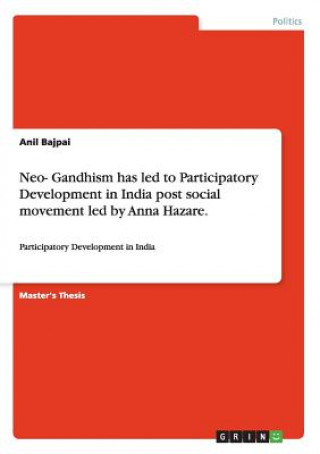
Kód: 05340816
Neo- Gandhism has led to Participatory Development in India post social movement led by Anna Hazare.
Autor Anil Bajpai
Master's Thesis from the year 2012 in the subject Politics - International Politics - Region: South Asia, grade: Merit, University of East London (School of Law and Social Sciences), course: NGO & International Development Managem ... celý popis
- Jazyk:
 Angličtina
Angličtina - Vazba: Brožovaná
- Počet stran: 68
Nakladatelství: Grin Publishing, 2014
- Více informací o knize

Mohlo by se vám také líbit
-

Real Lace Revisited
606 Kč -

Battle for Aberdeen 1644
442 Kč -

Getting Stronger
634 Kč -

Wont do it!
725 Kč -

Nclex-Pn
585 Kč -

Oxford American Handbook of Clinical Examination and Practical Skills
2756 Kč -

Start With Why
246 Kč -

Spice and Wolf, Vol. 12 (light novel)
280 Kč -

Twist
475 Kč -

Ist der Kampf der Kulturen vermeidbar und ein kultureller Dialog zwischen dem Westen und den islamischen Landern moeglich?
1063 Kč -

Hospodářská politika
359 Kč -

Naháči a načesáči
234 Kč -

Tvář na dluh
102 Kč -

Duden: Keine-Zeit-für-Langeweile-Block
165 Kč
Darujte tuto knihu ještě dnes
- Objednejte knihu a zvolte Zaslat jako dárek.
- Obratem obdržíte darovací poukaz na knihu, který můžete ihned předat obdarovanému.
- Knihu zašleme na adresu obdarovaného, o nic se nestaráte.
Více informací o knize Neo- Gandhism has led to Participatory Development in India post social movement led by Anna Hazare.
Nákupem získáte 149 bodů
 Anotace knihy
Anotace knihy
Master's Thesis from the year 2012 in the subject Politics - International Politics - Region: South Asia, grade: Merit, University of East London (School of Law and Social Sciences), course: NGO & International Development Management, language: English, abstract: The last decade has seen India emerging as one of the fastest growing economies in the face of a global economic meltdown. The year of 2010 saw Delhi host the Common Wealth Games, followed by the exposure of shoddy preparations, gross financial mismanagement and reports of rampant corruption in awarding lucrative contracts to dubious firms. The high and mighty became richer. This was followed by various other scams running into billions of worth of dollars of the taxpayers' money. The year of 2011 saw, Anna Hazare, a Gandhian social activist sit on a fast with few people supporting him in New Delhi demanding the formation of an independent ombudsman- the Jan Lokpal to investigate the corruption at high levels. The massive support to the protest from people in every major city, from every walk of life, in the country made the government sit up and take notice. The protest seemed to take the shape of a Gandhian mass movement with people joining the fast, wearing Gandhian white cap and determined to be non-violent. This paper set out to explore if this movement has resulted in any change in the attitudes and behavior of people resulting in participatory development. A questionnaire was drawn with four thematic statements inter-linking this movement and the effect it had on people's own attitudes towards participatory development. Twenty five respondents sent their views via electronic medium on issues of their own understanding of participatory development and the role gender within that context, their own stories and if they had played any role in the movement. The research analysis did not conclude a straight answer and was able to establish that participatory development does not exist in its entirety in India despite it being understood as the only way to holistic development. The reasons appeared to be more diverse and varied and were unable to indicate any changes in inner conscience vis-ŕ-vis personal lives as in Gandhian philosophy; making it imperative that a further and more extensive observational study may be needed to understand why participatory development still remains a theoretical concept at large.
 Parametry knihy
Parametry knihy
Zařazení knihy Knihy v angličtině Society & social sciences Politics & government International relations
1489 Kč
- Plný název: Neo- Gandhism has led to Participatory Development in India post social movement led by Anna Hazare.
- Autor: Anil Bajpai
- Jazyk:
 Angličtina
Angličtina - Vazba: Brožovaná
- Počet stran: 68
- EAN: 9783656730934
- ISBN: 3656730938
- ID: 05340816
- Nakladatelství: Grin Publishing
- Hmotnost: 100 g
- Rozměry: 210 × 148 × 4 mm
- Datum vydání: 27. August 2014
Oblíbené z jiného soudku
-

On Palestine
291 Kč -

Prisoners of Geography
276 Kč -

World Order
303 Kč -

International Relations, Global Edition
2702 Kč -

Grand Chessboard
561 Kč -

Diplomacy
487 Kč -

Clash of Civilizations and the Remaking of World Order
392 Kč -

Hundred-Year Marathon
392 Kč -

The Spy and the Traitor
323 Kč -

Understanding the Intelligence Cycle
1811 Kč -

Who Rules the World?
303 Kč -

Who Rules the World?
302 Kč -

Dead Aid
431 Kč -

World Order
378 Kč -

Adults In The Room
357 Kč -

Legacy of Ashes
451 Kč -

Evolution of Cooperation
471 Kč -

Strategic Vision
378 Kč -

Secret World
542 Kč -

Geopolitics and Geoculture
543 Kč -

Dawn of Eurasia
303 Kč -

How Spies Think
323 Kč -

Gaza in Crisis
303 Kč -

Planetary Cycles Mundane Astrology
479 Kč -

OVERTHROW : AMERICA'S CENTURY OF REGIME
626 Kč -

Is the EU Doomed?
612 Kč -

Righteous Victims
560 Kč -

Directorate S
431 Kč -

Europe's Border Crisis
1121 Kč -

America's Strategy in World Politics
1763 Kč -

Destroying Libya and World Order
481 Kč -

amantes del fin del mundo
568 Kč -

Critical Practices in International Theory
5256 Kč -

My Nationalist Pony
871 Kč -

American Century and Beyond
498 Kč -

Heroic Failure
302 Kč -

Oxford Handbook of the European Union
1429 Kč -

Rise and Kill First
487 Kč -

PEACE TO END ALL PEACE
608 Kč -

Tragedy of Great Power Politics
466 Kč -

Countdown to Zero Day
388 Kč -

Revenge of Geography
418 Kč -

Political Order and Political Decay
410 Kč -

Naked Diplomat
357 Kč -

Against Our Better Judgment
311 Kč -

After the Empire
396 Kč -

Legacy of Ashes
517 Kč -

Dragons and the Snakes
795 Kč -

Oxford IB Diploma Programme: Global Politics Course Book
1487 Kč
Osobní odběr Praha, Brno a 12903 dalších
Copyright ©2008-24 nejlevnejsi-knihy.cz Všechna práva vyhrazenaSoukromíCookies



 Vrácení do měsíce
Vrácení do měsíce 571 999 099 (8-15.30h)
571 999 099 (8-15.30h)